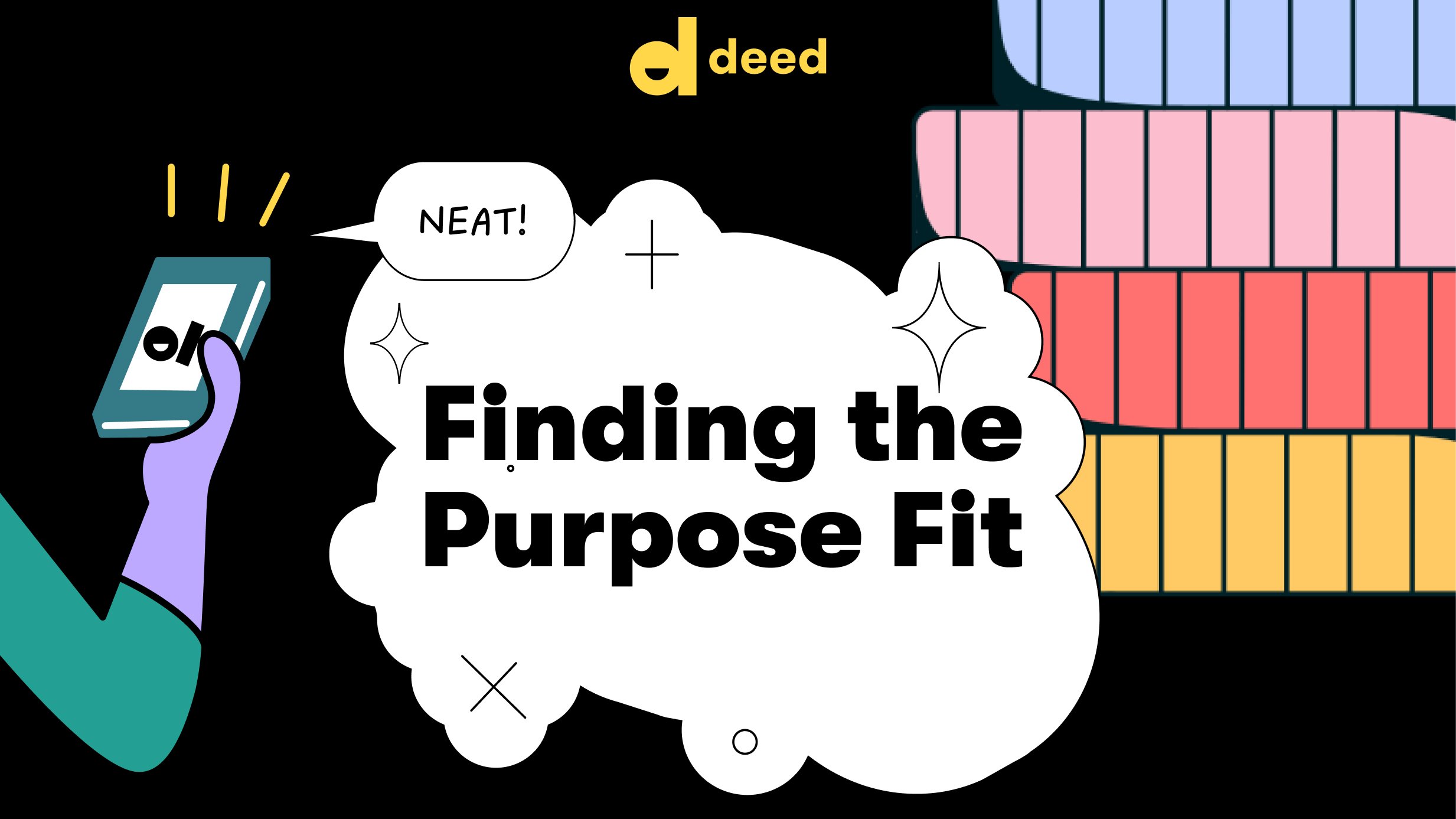Finding the Purpose Fit: Social Impact Tech RFP Timeline & Best Practices
Here’s what you need to know before launching a request for proposal (RFP) of workplace giving and volunteering tech.
Introduction
From Airbnb to United Talent Agency, social impact teams at some of the world’s most inspiring companies are increasingly turning to workplace giving and volunteering tech as a way to engage their employees and expand the scope of their efforts.
If your team is considering social impact tech to modernize corporate philanthropy and help employees find a deeper sense of purpose, you will likely soon launch a request for proposals (RFP) from the various tech providers on the market.
But one thing you will not want to forget throughout the planning and evaluation process is time. While social impact tech RFPs vary in length from company to company, with some lasting just a week but most falling somewhere between four and six months.
So what would an ideal RFP process look like? What stakeholders should you engage? Are there reliable best practices? What are the most important topics to address? And how soon can you get from the proposal stage to making a tangible social impact?
Here is an overview of the social impact tech RFP process, best practices, timeline, and insight into how to democratize corporate social responsibility (CSR).
2023 Trend: RFPs are more formal—and more valuable—than ever
Social impact teams are often working with strictly defined budgets, which means they have to be highly selective about which new technologies to bring into their workflow.
In the past, most companies evaluated proposals from tech providers on an ad-hoc basis. But according to the Loopio’s “2023 RFP Response Trends and Benchmarks Report,” the trend amongst 1,500 organizations is toward a more careful and formal process. This gives companies more time to decide which giving and volunteering platform will help them engage their employees in doing good deeds and meet their overarching goals.
Best Practices
The RFP process can differ greatly from one company to the next, even when considering the same social impact tech providers. Whether you have 500 employees or 50,000, here are some key things to keep in mind to make your proposal evaluation stage as smooth and clear as possible.
Establish your Employee Engagement and CSR Goals
Think of social impact tech as a powerful tool you can use to meet ever-ambitious goals for engaging employees and making an impact. Consider:
- What does your CSR current program look like right now and what are your aspirations to moving to a new technology partner?
- What percentage of employees currently engage in your social impact initiatives? What would you like that number to be next year?
- What is your end goal?
- What are the milestones/deadlines?
Ask: Why will tech help us solve our problem?
Too many companies put the cart before the horse by pursuing social impact tech before really understanding what they want to get from it. Before embarking on this journey, you should find out if your platform is prepared to:
- Increase engagement;
- Expand your reporting capabilities;
- Improve technical capabilities through more and better integrations with supported application programming interfaces (APIs);
- Solicit your feedback on the product roadmap; and,
- Give your employees and program leaders an easier user experience and higher-quality support than you’re currently getting.
Reach out to all internal stakeholders
With the RFP, be sure to include key stakeholders involved with CSR platform decisions including:
- Technical teams including human resources information systems (HRIS) and single sign-on (SSO);
- Trust and Security;
- Legal;
- Finance;
- Payroll;
- Diversity, equity, inclusion, and belonging (DEIB);
- Executive sponsor;
- Procurement
- Marketing;
- Communications;
- Foundation;
- In some cases your board of directors; and,
- Anyone else whose work social impact technology will touch
Each member of your team will have different priorities when it comes to evaluating a new CSR platform and it's important that they are involved from the beginning. This will also make for a smoother transition to implementation after a decision has been made on the CSR platform that is the best fit for your program.
Remember: Before suggesting a modernization of your company’s program, or pitching the first-ever formal program, it would be smart to think about how corporate social responsibility would really work at your company. Read the introduction to our “Finding the Purpose Fit” series for deep-dive on the day-to-day work of CSR and internal communications strategies.
The Ideal RFP Timeline
While the RFP process can look different from one company to the next, there are certain benchmarks and goals that many of us can agree would be ideal to hit. Here, we’ve estimated the amount of work involved in the most common phases of an RFP based on the average programmatic needs and technical requirements of a Fortune 1,000 company.
Phase I: Before the RFP (3-4 weeks)
Use this time to work with your team and figure out what your project requirements and objectives are, your budget, the features you want your social impact platform to have, any technical/security requirements, and any other must-haves.
For the best experience, we recommend meeting with the tech provider’s team before the RFP process starts to craft a timeline that makes sense for both parties. In most cases, prospective partners will be eager to learn more about your program and share what their platform can do for your program. They may even offer advice tailored to your unique needs, all of which can help you come up with a standard set of questions and considerations to ask the other candidates.
Phase II: RFP (2-3 weeks)
In this phase, you will solicit proposals from select prospective partners, who will get to work answering all of your RFP questions in technical detail, and sharing any necessary documentation.
Keep in mind that while you may be the point person for your organization’s RFP process, your prospective partners will likely treat this as an all-hands-on-deck situation. It’s not uncommon for sales, partner success, nonprofit success, legal, trust and security, and other teams to get involved if it’s necessary to answer your questions.
Transparency and communication are key to managing expectations during this phase.
Phase III: RFP Evaluation (4-6 weeks)
Next, your team will review the tech providers’ answers to your initial questions. Many providers will be happy to answer any additional questions via email, phone/video call, or in person. Remember: You are making an important decision and we want to make sure that the experts in the field are the ones answering your questions.
Members of your team may request additional “deep-dive” meetings to go into more depth on topics such as a payroll (with your finance team) or a technical architecture review (wth your security team). Prospective partners may even offer a series of live demonstrations for your stakeholders to walk everybody through the platform in as much detail as would help your team feel comfortable and confident as possible.
It’s important to keep your company’s calendar in mind when scheduling your RFP. Various key stakeholders on your team will only be available to assist with your RFP evaluation due during defined windows, owing to any other project commitments they’ve made at your company. Plan accordingly so that everyone has the time and resources they need to review your tech provider’s offerings and ask any follow-up questions.
Phase IV: Contracting (3-4 weeks)
Next, you and your team will have done your due diligence and. Based on your programming needs and vision for your employee engagement program, you will have decided on a social impact platform. Now it’s time for contracting.
Your legal and procurement teams will be heavily involved in this phase. The tech provider’s legal team will work closely with you to draft a proposal, statement of work (SOW), service level agreement (SLA), or any other documents needed. You will work together to ensure that all paperwork reflects mutually agreed-upon guidelines.
Once the proposal has been signed by both parties, your partnership is official and it’s time to take a tech-driven approach to social impact.
Phase VI: Implementation (8-12 weeks)
The implementation process is when the real fun starts. Whether you’re transitioning from an outdated software that can’t keep up with your evolving needs or even bringing in your company’s first-ever CSR, this is when you will meet your partner success manager and lay the foundation for easy, impactful giving and volunteering.
Annette Groenewegen is a social impact expert with years in the space. As a partner implementation manager at Deed, Groenewegen stresses that large, complex multinational organizations with many different stakeholders and shifting priorities should look for a partner with “a strong track record of supporting prospective partners through all stages of the RFP, including platform launch.”
Deed also has a unique partnership with Onboard.io, an industry leader in tech-driven solutions to implementation, digital adoption, and seamless customer experience. Learn more about Deed’s relationship-oriented, tech-driven approach to RFP support.
Additionally, it’s a good sign if your social impact tech partner makes the effort to keep you in touch with the same, dedicated partner success manager for as long as possible. That means no delays, handoffs, or communication breakdowns.
How Deed makes the social impact tech RFP process easy
A growing community of the world’s most inspiring companies—like Airbnb, lululemon, Kyndryl, and Ripple—trust Deed to help them play a meaningful role in climate change, social progress, and corporate governance.
Why Deed? We strive to make the RFP process as seamless as possible, so your team can focus your time and energy on making an impact.
Consultative approach
We proactively help potential partners think through what questions to ask in their RFPs so you feel prepared every step of the way.
Responsiveness and flexibility
Our nimble team moves at your pace. You may discover during the RFP process that you have more needs than you initially thought. Because Deed is an all-in-one platform, we’re always excited to expand our offering (e.g., from corporate donations to workplace philanthropy and employee engagement).
Deed hires for industry expertise
The Deed team comes from a wide range of backgrounds in the public, private, and nonprofit sectors. Every question you may have will receive the full attention of social impact experts.
Flexible contracting process with SafeBase means infosec is a breeze
We are proud to partner with SafeBase, which enables security and sales teams to proactively share and automate access to security, compliance, and privacy information. This partnership helps us answer your complex technical questions fast.
Cohesive implementation process supported by tech tools like Onboard.io
As mentioned, Deed also has a unique partnership with Onboard.io, an industry leader in tech-driven solutions to implementation and digital adoption. We strive for a seamless implementation and launch process that moves at your pace.
Conclusion
Modernizing your social impact program will be an exciting time for your organization, especially if it means working with a new tech provider who can help engage your employees around doing good deeds.
Deed is a workplace giving and volunteering platform that puts people first, because user experience shouldn’t stand between you and doing good. We foster genuine human connection across departments and time zones by empowering employees to support causes they care about together, both in-person and online.
Now imagine all your community’s good deeds happening on a single, exceptionally designed platform—with you at the switchboard, watching an enterprise transform into a more positive force in the world.
To learn how Deed can help drive employee engagement in social impact at your organization from the RFP to your next volunteer event, book a demo today.


